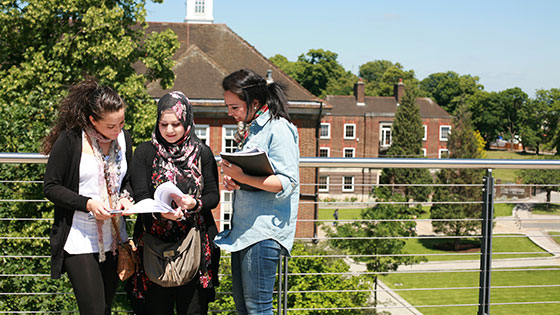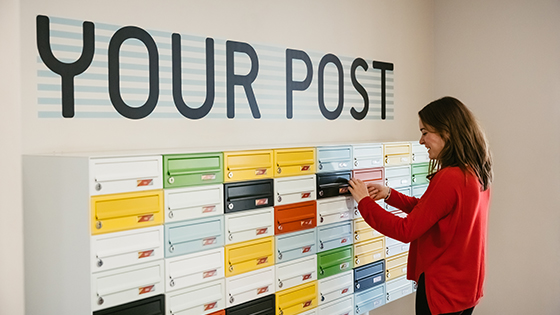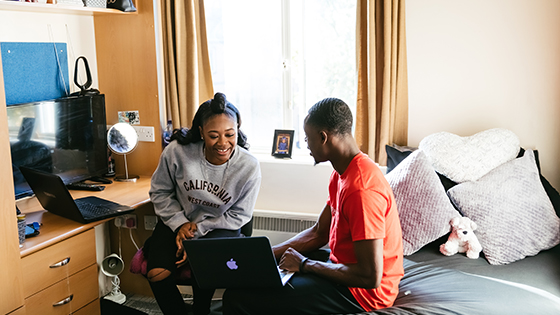Looking to live off campus? Start your search early to make sure you have plenty of choice.
The Middlesexstudentpad is an excellent place to start your accommodation search as it features up-to-date details of rented accommodation, landlords' contact details, examples of rent and other relevant information. It also includes a message board, allowing you to see notices posted by other students about available housing and rooms.
We suggest you confirm all the details shown on the website with the owner of any accommodation before accepting a room and signing a lease.
High street or online agencies generally deal with renting entire flats or houses but do sometimes have lists of available shared properties on request. Have a look through the Estate and Letting Agencies List as an impartial guide to get your search started.
Please note, it's illegal for an agency to charge you for registering with them or to provide addresses of properties. They can only charge a fee once you have secured accommodation. Find out in advance if there are any relevant charges before you use an agency and always get a receipt for any money you pay.

Newspapers often have a properties section and local newspapers such as Barnet and Finchley Press, Hendon & Finchley Times and the Islington Gazette will have sections dedicated to the surrounding areas.
We can help you with your initial start right though to moving in and paying your deposit.
Email: pra@mdx.ac.uk
Telephone: 020 8411 6121
There are plenty of places available to rent near campus and many different options to consider with private rented accommodation.
This usually refers to renting a room in a house with a live-in landlord. You will have you own room and use of shared areas such as the kitchen, lounge, bathroom, or outside spaces. You will usually have to pay a deposit to ensure you adhere to the terms and conditions of your tenancy agreement and in most cases, there is no formal rental contract. However, make sure to get formal agreements in writing.
The majority of lodgings will be self-catering with use of the household kitchen by arrangement, although some owners may be prepared to provide meals.
This is popular option for our mature students who prefer a quieter lifestyle. You will typically sign a contract for a minimum of six months before moving into a property and will usually have to pay a non-refundable cash deposit.
If you are looking for short-stay accommodation, there are hotels, guesthouses, and bed and breakfast accommodation for a range of budgets across north London. For more information and contact details, please download our short-stay accommodation list.
Most student accommodation is for single people or groups of friends (single rooms in shared accommodation). If you have a family, you may want to use local letting agents to help you in your search for suitable rented accommodation.
You can find a list of local letting agents on Middlesexstudentpad. You may also wish to contact Nansen Village, a housing association that provides accommodation for overseas postgraduate students and their families.
As soon as you see a room or flat you like, get in touch with the owner or agent as soon as possible to arrange a viewing. If, after seeing the property, you want to move in, you will be asked to pay a holding deposit to partially secure it while your references and additional paperwork are being sorted.
The holding deposit is usually not refundable so make sure you definitely want the room or flat before paying.
Find out at the start how much rent you are expected to pay and what services are covered within the rent.

Make sure you've found the perfect accommodation by getting answers to these main questions:
There may be other questions you want to ask during the signing and leasing process so don't be afraid to ask them. If you're not happy with anything, don't go ahead.
To secure private rented accommodation, most landlords and agencies will require you to provide details of a guarantor who can be held accountable if you default on your rent. If you require a UK guarantor to rent privately please visit Guarantor Service | Housing Hand
Before you sign the contract, make sure to carry out an inspection of the property - not just the room you'll be staying in. You need to be sure that where you'll be staying is safe and clean. Any repairs should be carried out before you move in and it's advisable not to sign your contract until they are.
Read the gas and electricity meters as soon as you move in to ensure that you only pay for units you use. Check with the individual service supplier for their standard procedures if you are in a shared flat.
Try and find the main gas and electricity, and water supply stop when you move in too. You'll need to find them quickly in case of emergency.
Once you have moved into the property, check that everything is clean and in good order. This is especially important if you have paid a deposit, as a deduction may be made to cover breakages or cleaning at the end of your stay.

Report any repairs to the owner or the agent as soon as possible. If they fail to respond or investigate, The Local Authority Housing Advice Centre can help with advice on getting a fix.
If the repair could be classed as an emergency, contact the Local Authority Environmental Health Officer who can be asked to visit and inspect the property and insist that the repairs are carried out. Fore more information, please visit the Barnet Hub Citizens Advice Bureau.
It is the landlords' responsibility to ensure that all gas appliances, flues, meters and pipe works are fitted professionally and maintained in good order.
An annual safety check is required and you must be provided with a copy of the safety check record or certificate before you move in. It can also be displayed on the premises.
Before signing any tenancy agreement, it is very important for you to exercise your right to see the Gas Safety Certificate.

The electrical safety regulations requires electrical appliances, including their leads, are checked by a competent and suitably qualified engineer and any unsafe items removed. Dangerous electrical appliances or damaged sockets can cause fire or serious injury.
For further advice please contact The National Inspection Council for Electrical Installation Contracting.
All upholstered or foam-filled furniture (including sofas, armchairs, cushions, mattresses and pillows) supplied by landlords must meet the fire resistance requirements of the Regulations and must be labelled as such.
An owner/agent may ask you to remove furniture you bring from home if it does not meet the standards.
For further advice please contact The Fire Safety Advice Centre.
For detailed information about renting private accommodation, we have created the How to Rent guide below. This can be viewed full screen by clicking the Full Screen icon at the top of the Window.
If you prefer to view as a standard PDF, please click the following link: How to Rent Guide - Standard PDF
Council tax is a charge on residential properties to pay for local services such as rubbish collection, the police and the fire brigade. Only properties occupied exclusively by full-time students do not have to pay this.
If you are a full-time student and you share a property with part-time or non-students, you should confirm your student status to the landlord or Local Authority to get an exemption or reduction in your bill. You can order an exemption letter through your myUniHub account (Your support services >> Letters and Forms).
If you are a full-time student in private accommodation and have completed the taught element of your studies, deferred exams, coursework or dissertations, you could be liable to pay council tax.
You may be required to pay a deposit (usually equivalent to one month's rent) either before or at the time you sign the tenancy agreement. The deposit is usually held against any damages, unpaid household bills, rent arrears or unclean condition of the property at the end of the contract or before you move out.
Make sure to get in writing the amount you've paid and what it covers. You also need to be clear if it's a refundable deposit as there may be conditions to getting it all returned.
An inventory is the best way to catalogue the condition of the property or room as well as listing the items included in the rent (for example if the room is furnished or not). This can help avoid disputes at the end of your tenancy. Always keep a copy of the signed and dated inventory.
Before you begin renting a room or a property, you will be asked to provide some form of personal or financial reference. Increasingly, landlords and agents are requesting guarantors to be supplied as well to be used if you default on your rent. If you require a UK guarantor to rent privately please visit Guarantor Service | Housing Hand
The landlord or agent may require an amount, usually one month's rent, in advance. This is usually used to cover the last month of your tenancy.
All deposits taken by landlords or agents must be protected with one of three government approved schemes:
This must be done within 30 days of the deposit being paid and you should receive a confirmation within the 30 days.
When you are looking to move out, the condition and contents of the property will be checked against the tenancy agreements made at the start of your contract.
You and the landlord or agent will discuss how much of the deposit will be returned to you and the amount will then be returned within 10 days. If no agreement can be reached, the scheme protecting the deposit will offer a free service to resolve the dispute. You can also contact the The Dispute Service.
Lodgings accommodation are currently not covered by the scheme.
Please visit the Department for Communities and Local Government for more information on the Tenancy Deposit Scheme.
During your tenancy, you might be expected to pay the gas, water and electricity bills. Check who the provider is when you move in and make sure to read the meters as soon as possible to start paying the right amount.
